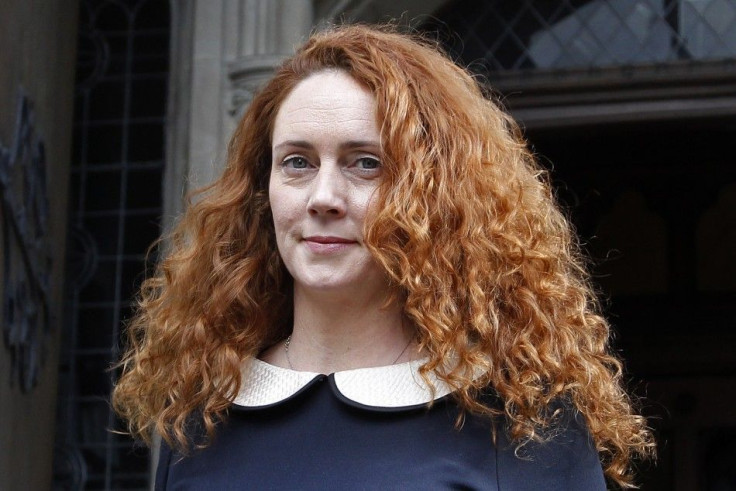Who Is Rebekah Brooks? Meet The Central Figure In The News Corporation Phone Hacking Scandal

Before getting arrested on charges of intercepting phone messages of celebrities, politicians and other public figures, Rebekah Brooks was a British journalist, editor and chief executive of Rupert Murdoch's British newspaper subsidiary, News International.
Brooks started her career by working for the French magazine L'architecture d'aujourd'hui in Paris. She eventually went on to work for a number of publications before making her way to News International.
In 1989, she started working as a secretary for News of the World before working as a feature writer for its Sunday magazine.
An excerpt from The Insider, the memoir of Pierce Morgan, her former boss, reads, In 1994, Brooks prepared for the News of the World's interview with James Hewitt, a paramour of Princess Diana, by reserving a hotel suite and hiring a team to kit it out with secret tape devices in various flowerpots and cupboards.
In 1998, Brooks transferred to the News of the World's daily counterpart, The Sun. It is reported that during her time there, Brooks attempted to persuade David Yelland, editor of The Sun, to end the Page Three Girls feature, before switching back over to News of the World.
Brooks returned to the News of the World in 2000 as editor, but eventually went back to The Sun in 2003, replacing her former boss David Yelland, to become its first female editor.
During a March 2003 appearance before the House of Commons Select Committee on Culture, Media and Sport as part of an inquiry into privacy issues, Brooks stated that her newspaper had paid police officers for information - a move that would haunt her later in her career.
In June 2009, it was announced Brooks would leave The Sun to become chief executive of the newspaper's parent company, News International.
Brooks' decorated career, along with many others, eventually got exposed when a police enquiry revealed that the News of the World had a routine practice of intercepting mobile phone messages of celebrities, politicians and other public figures.
As a result of the scandal, News Corporation's second largest shareholder, Prince Al-Waleed bin Talal Alsaud, called for her resignation in a BBC interview.
Jusy two days before being arrested on July 17, 2011, by police on suspicion of conspiring to intercept communications and on suspicion of corruption allegations, Brooks resigned from News International.
As chief executive of the company, I feel a deep sense of responsibility for the people we have hurt and I want to reiterate how sorry I am for what we now know to have taken place. I have believed that the right and responsible action has been to lead us through the heat of the crisis. However my desire to remain on the bridge has made me a focal point of the debate. This is now detracting attention from all our honest endeavours to fix the problems of the past. Therefore I have given Rupert and James Murdoch my resignation. While it has been a subject of discussion, this time my resignation has been accepted, Brooks said in a statement.
Brooks was eventually arrested by detectives working on Operation Weeting, the Metropolitan Police's phone hacking probe, and Operation Elveden, the probe examining illicit payments to police officers.
After 12 hours in custody, Brooks was released on bail.
She was then rearrested on March 13, 2012 together with her husband, on suspicion of conspiracy to pervert the course of justice.
Brooks has not yet been formally charged and has consistently denied knowing that phone hacking and other malfeasance were occurring at The News of the World.
While the investigation is still underway, authorities are currently looking in to Brooks' ties to top political figures in the UK.
Brooks recently attended an inquiry to speak to on the investigations current focus -- the relationship between politicians and the news media in Britain. The picture she painted was one of seemingly unrestricted access for her and her boss, Mr. Murdoch, according to The New York Times.
Citing Brook's testimony during the inquiry, The Times reports that when political leaders were not arranging birthday parties for Brook's or meeting her for cozy private dinners or sending her notes or attending her wedding, she was picking up the phone to chat with them - or sometimes to cajole or strong-arm them into seeing things her way.
Nonetheless, brooks has repeatedly stated that she or Murdoch did not did not exert any special influence over politicians. When Robert Jay, the counsel for the inquiry, put it to her that media executives and editors were 'unelected forces' influencing policy by exercising power over governments, Ms. Brooks said she disagreed, wrote The Times.
Your power is your readership . . . It's not an individual power. It's a readership power, Brooks said. Every day, the readers can unelect us.
© Copyright IBTimes 2025. All rights reserved.





















